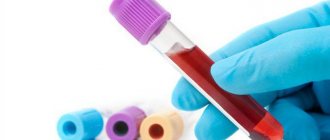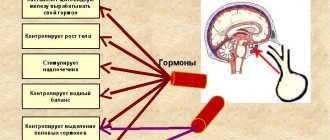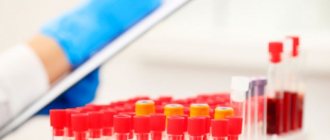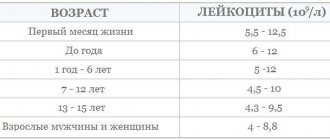The level of antibodies to the thyroglobulin protein is normally insignificant, since they are formed as a reaction of the body’s immune system to contact with thyroglobulin. Typically, this colloidal protein is located in the enclosed space of the follicle and does not provoke the formation of antibodies. The reason for exceeding the norm for antibodies to thyroglobulin may be damage to the follicle and the release of a significant amount of thyroglobulin into the blood. Then, in the results of tests for antibodies to thyroglobulin, increased values are recorded.
Detailed description of the study
The thyroid gland is a small organ located in the neck. The hormones triiodothyronine (T3) and thyroxine (T4) are produced in the cells of the thyroid gland, which are involved in the body’s most important metabolic processes. They ensure the supply of oxygen and sufficient energy exchange in the cells and tissues of the body, the onset and healthy course of pregnancy. The production of T3 and T4 is carried out under the control of another gland - the pituitary gland, located among the structures of the brain through the release of thyroid-stimulating hormone (TSH). An imbalance between the production of pituitary and thyroid hormones leads to changes in the endocrine function of these organs. This situation is observed in autoimmune thyroiditis - chronic inflammation of the thyroid gland caused by the body's immune aggression against this organ. The process is accompanied by the formation of antibodies to thyroid-stimulating hormone receptors in tissues (AT-TSH) and some substances produced by the gland. These substances include thyroglobulin. It is a precursor to the hormones T3 and T4, and is practically not released into the bloodstream normally. The destruction of pancreatic cells leads to an increase in the concentration of thyroglobulin in the blood and provokes the formation of antibodies to this protein (AT-TG). Other diseases of the thyroid gastric gland (diffuse toxic goiter, subacute thyroiditis) and autoimmune systemic diseases (systemic lupus erythematosus, Sjogren's disease, type 1 diabetes mellitus, rheumatoid arthritis) also lead to the appearance of AT-TG. An increase in the production of thyroid hormones, observed in some cases with autoimmune damage, is called hyperthyroidism. It is manifested by the following symptoms: - Increased activity, excitability - Sleep disturbance - Feeling hot, increased sweating - Increased appetite - Unexplained weight loss - Tendency to diarrhea Prolonged inflammation of the thyroid gland reduces the ability of this organ to produce hormones, resulting in hypothyroidism. It can be manifested by the following symptoms: - Pathological fatigue, fatigue - Dry skin - Excess weight due to fluid retention in the body - Poor tolerance to cold - Depression - Drowsiness - Decreased memory - Tendency to constipation An endocrinologist is involved in the diagnosis and treatment of thyroid diseases. If an autoimmune systemic disease or damage to only the thyroid gland is suspected, testing the titer of antibodies to thyroglobulin allows us to understand the cause of the disease and promptly prescribe treatment.
Antibodies to thyroglobulin (AT-TG)
What are antibodies to thyroglobulin (AT-TG, anti-thyroglobulin autoantibodies)?
This is an iodized protein, the main substance of the thyroid gland, from which thyroid hormones (T4 and T3) are formed. When the thyroid gland is diseased, the body's immune system may produce antibodies to thyroglobulin (autoimmune aggression). Autoantibodies to thyroglobulin disrupt hormone synthesis, thereby causing hypothyroidism.
Antibodies to thyroglobulin are an important parameter for identifying autoimmune diseases of the thyroid gland, such as Hashimoto's disease, atrophic autoimmune thyroiditis, Graves' disease (diffuse toxic goiter). Detection of antibodies makes it possible to detect the disease much earlier than its clinical manifestations.
The combination of antithyroglobulin antibody and antithyroid peroxidase antibody can detect most cases of Hashimoto's disease and determine the nature of primary idiopathic hypothyroidism.
The titer of antibodies to thyroglobulin in the blood correlates more with the content of thyroid-stimulating hormone than with the concentration of thyroglobulin. The use of antibodies to thyroglobulin to detect autoimmune thyroid diseases is especially justified in iodine-deficient regions.
Determination of antibodies to thyroglobulin, as well as antibodies to thyroid peroxidase, makes it possible to predict dysfunction of the thyroid gland in patients with other autoimmune endocrine diseases and in family members with hereditary organ-specific autoimmune diseases. Children born to mothers with high titers of antibodies to thyroglobulin may develop autoimmune thyroid diseases during their lifetime, which requires classifying such children as a risk group.
Assessment of the functioning of the thyroid gland should be carried out comprehensively (determining the level of thyroid-stimulating hormone, total T3, total T4, free T4; antibodies to thyroglobulin, to thyroid peroxidase).
Indications for the purpose of analysis:
- high level of AT-TG in the mother (for newborns);
- chronic thyroiditis (Hashimoto's);
- differential diagnosis of hypothyroidism;
- goiter;
- diffuse toxic goiter (Graves disease);
- dense swelling of the legs (peritibial myxedema).
When is the level of antibodies to thyroglobulin elevated?
- Chronic thyroiditis (Hashimoto's type).
- Idiopathic hypothyroidism.
- Hyperthyroidism (Graves' disease, nodular form).
- Euthyroid goiter.
- Hyperthyroidism in newborns.
- Autoimmune thyroiditis.
- Diffuse toxic goiter (Graves disease).
- Thyroid cancer in the presence of regional metastases.
- Down syndrome (weak positive result).
Thyroglobulin as a tumor marker
At the Northwestern Endocrinology Center, a blood test for thyroglobulin is not prescribed during the initial examination. We are well versed in thyroid diseases and we care about our reputation, so we try to save our patients money and not waste it.
At the same time, if you look at the number of thyroglobulin tests that the Northwestern Endocrinology Center performs annually, we are now among the Russian leaders in the number of such tests. The thing is that our center is the Russian leader in the treatment of differentiated thyroid cancer - papillary and follicular. Every year, the center performs about 700-800 operations for thyroid cancer, and several tens of thousands of patients who have been treated previously are under observation. And for all these people, thyroglobulin is the main indicator. All these patients donate blood for analysis annually or even somewhat more often, and each time for them it is stress, it is an expectation - is thyroglobulin elevated or not? And in this group of patients, thyroglobulin is really a tumor marker, since the thyroid gland and tumor had already been removed earlier, then many patients were treated with radioactive iodine to destroy even the smallest remnants of the gland and tumor tissue.
After successful treatment of differentiated thyroid cancer, the blood thyroglobulin level should not exceed 2 ng/ml
(against the background of a three-week withdrawal from thyroxine), if radioiodine therapy was previously carried out, and
5 ng/ml
if radioiodine therapy was not carried out. Of course, the lower the thyroglobulin, the better, but the level, even after successful treatment of the tumor, is rarely completely zero. The sensitive 3rd generation analyzers that we use even the smallest amounts of thyroglobulin in the blood, so its level in the blood is almost always just above zero.
And the most important…
At the end of this short article, I would like to say that thyroglobulin is a highly specialized laboratory indicator that is used only in some selected situations. It should be used only for its intended purpose and not used where you can do without it. Elevated thyroglobulin
Blood tests aimlessly scare thousands of people every year, but for thousands of people every year,
the thyroglobulin level
gives hope for a normal life - it’s all just a matter of who prescribes the test, in what situations and how the results are then interpreted. The 3rd generation immunochemiluminescent laboratory of the Northwestern Endocrinology Center determines thyroglobulin with extreme accuracy, and the center’s specialists know very, very much about it, so if you suddenly have any questions or misunderstanding of your tests or your doctor’s tactics, come to us to the center for a consultation or re-analysis in order to remove all questions and understand how and where to move on.
Thyroglobulin is elevated - why? What is the normal thyroglobulin level?
Thyroglobulin is normally located in the lumen of the follicles and enters the blood only in minimal quantities. Its increased “leakage” into the blood is observed when thyroid tissue is destroyed due to various influences:
- autoimmune inflammation in Hashimoto's thyroiditis, diffuse toxic goiter, subacute thyroiditis;
- purulent inflammation with purulent thyroiditis;
- destruction of thyroid tissue in the patient’s body after radioactive iodine therapy;
- destruction of thyroid nodule tissue after ethanol sclerotherapy, radiofrequency ablation, laser destruction, or even after fine-needle biopsy of the nodule;
- destruction of gland tissue after diagnostic scintigraphy of the gland using iodine-131, which, in addition to diagnostic gamma radiation, also has beta radiation that destroys thyroid tissue;
- death of residual thyroid cells after thyroidectomy or partial resection of gland tissue (after any surgery on the gland).
«Thyroglobulin normal
“,” “
increased thyroglobulin
,” “
what to do; increased thyroglobulin
” - these queries are regularly found in search engines such as Yandex or Google. The wording of the search query itself already indicates that most patients do not understand what thyroglobulin is and in what cases its level can be used in diagnosis.
It is important to understand that in patients with a preserved thyroid gland, the level of thyroglobulin should not be determined at all. An analysis for thyroglobulin in the presence of a thyroid gland will only show how large the gland is, how well or poorly it works, and whether there is an inflammatory process in the tissue or not. Indeed, the level of thyroglobulin in the blood depends only on:
- the volume of the thyroid gland and the size of the nodes present in it;
- activity of hormone production;
- the presence or absence of inflammatory processes in the gland tissue.
The larger the volume of the thyroid gland, the more it produces thyroglobulin - this is logical. The more active the thyroid gland is, the more hormones it releases into the blood, the more thyroglobulin is required - this is also logical. The more active the process of inflammation occurs in the gland tissue, the more actively the cells themselves and the follicles formed by the cells are destroyed, and the more actively thyroglobulin leaks into the blood - and this is also quite logical.
At the same time, if a non-specialist turns to Internet materials, the first thing he will glean from them is information that thyroglobulin is a tumor marker, that its level indicates the risk of thyroid cancer. As a result, many patients experience stress, which is usually not based on anything, and which does nothing but cause unnecessary harm.
It is important to understand one feature: yes, this is a tumor marker, yes, its level increases in patients with recurrent papillary or follicular thyroid cancer, but this dependence “increased thyroglobulin = relapse of thyroid cancer” occurs only in those patients WHO HAVE PREVIOUSLY REMOVED THE THYROID GLAND .
Think about it, this is also quite logical - if we know that thyroglobulin in the human body is produced only by the cells of the thyroid gland, as well as by the cells of two malignant tumors of the thyroid gland (papillary and follicular cancer), then we must understand that after complete removal of the gland and complete After removing the tumor, there should be no places left where thyroglobulin can be produced, and therefore its level should become very low, close to zero.
However, this relationship is only valid if the thyroid gland and tumor are first removed. If the patient’s thyroid gland is in its usual place, if no operations have been performed, then the blood test for thyroglobulin itself loses all meaning. Even if you and I see that thyroglobulin is elevated, what will we do? What medical recommendations can an endocrinologist give to a patient in this case? Absolutely none. The level of thyroglobulin in the blood, whether it is elevated or not, with a preserved thyroid gland is not the basis for determining treatment tactics, therefore this test should not be taken - this would be a pure waste of the patient’s funds.
Currently, specialists at the North-Western Endocrinology Center very often have to meet with patients from various regions of Russia who come to us for expert consultation with one question: “What to do - increased thyroglobulin?” It is very sad to see how people come from distant cities - Krasnodar, Murmansk, Magadan, only to find out that their analysis does not indicate any diseases, and that they are generally completely healthy. Of course, it happens that our endocrinologists identify various diseases of the thyroid gland in patients who come to us, it even happens that we perform some kind of surgery on the thyroid gland, but blood thyroglobulin is never an indication for treatment or a diagnostic criterion in such cases. .
Why do doctors prescribe thyroglobulin testing to patients across the country? Don’t endocrinologists themselves understand that this indicator is diagnostically unreliable? There are only two possible explanations for the fact that this analysis is widely used: either the doctor himself does not really understand the meaning of this indicator, or he understands this meaning (or rather, understands that there is no special meaning), but prescribes it simply to increase the patient’s expenses.
Diseases of the thyroid gland that require testing for elevated thyroglobulin
An analysis for elevated thyroglobulin is done in the following cases:
• For thyroid carcinoma. But it should be remembered that only a third of patients with thyroid cancer have an increase in the concentration of this protein;
• For the purpose of early detection of metastases or relapses of tumors after surgical treatment has already been performed. A relapse of both malignant and benign thyroid tumors may be indicated by increased thyroglobulin in the blood plasma;
• Determination of the effectiveness of radioactive iodine therapy for the metastatic process in thyroid tumors;
• For the diagnosis of artificial thyrotoxicosis (against the background of hormone replacement treatment);
• Thyroglobulin, the norm of which is increased, is assessed in children to determine the origin of congenital hyperfunction of the thyroid gland;
• As a tumor marker and a means for assessing the effectiveness of treatment of thyroid tumors;
• To assess the activity of thyroiditis or confirm previous inflammation of the thyroid gland in the next 2 years;
• For mass studies in conditions of iodine deficiency.







